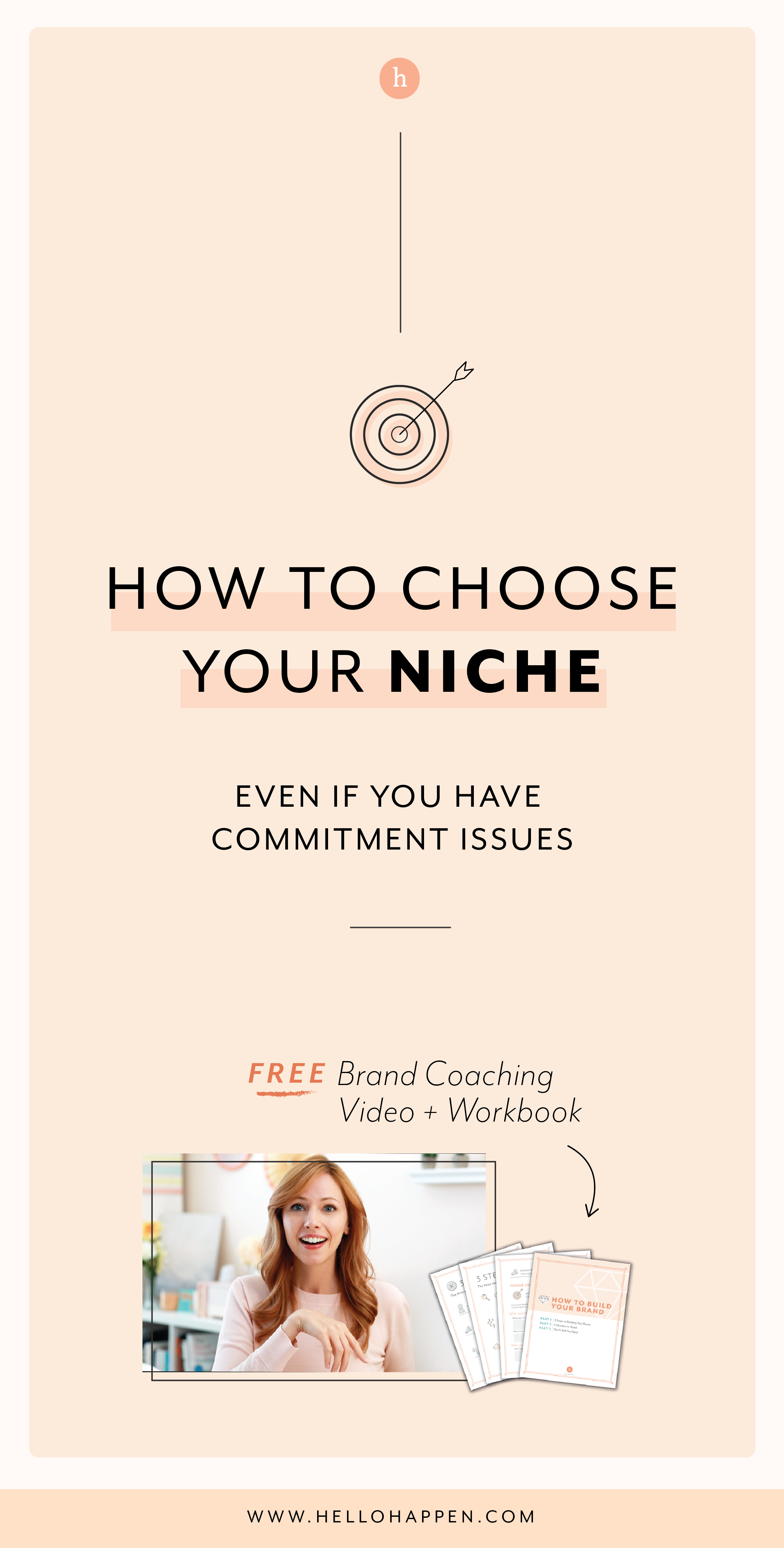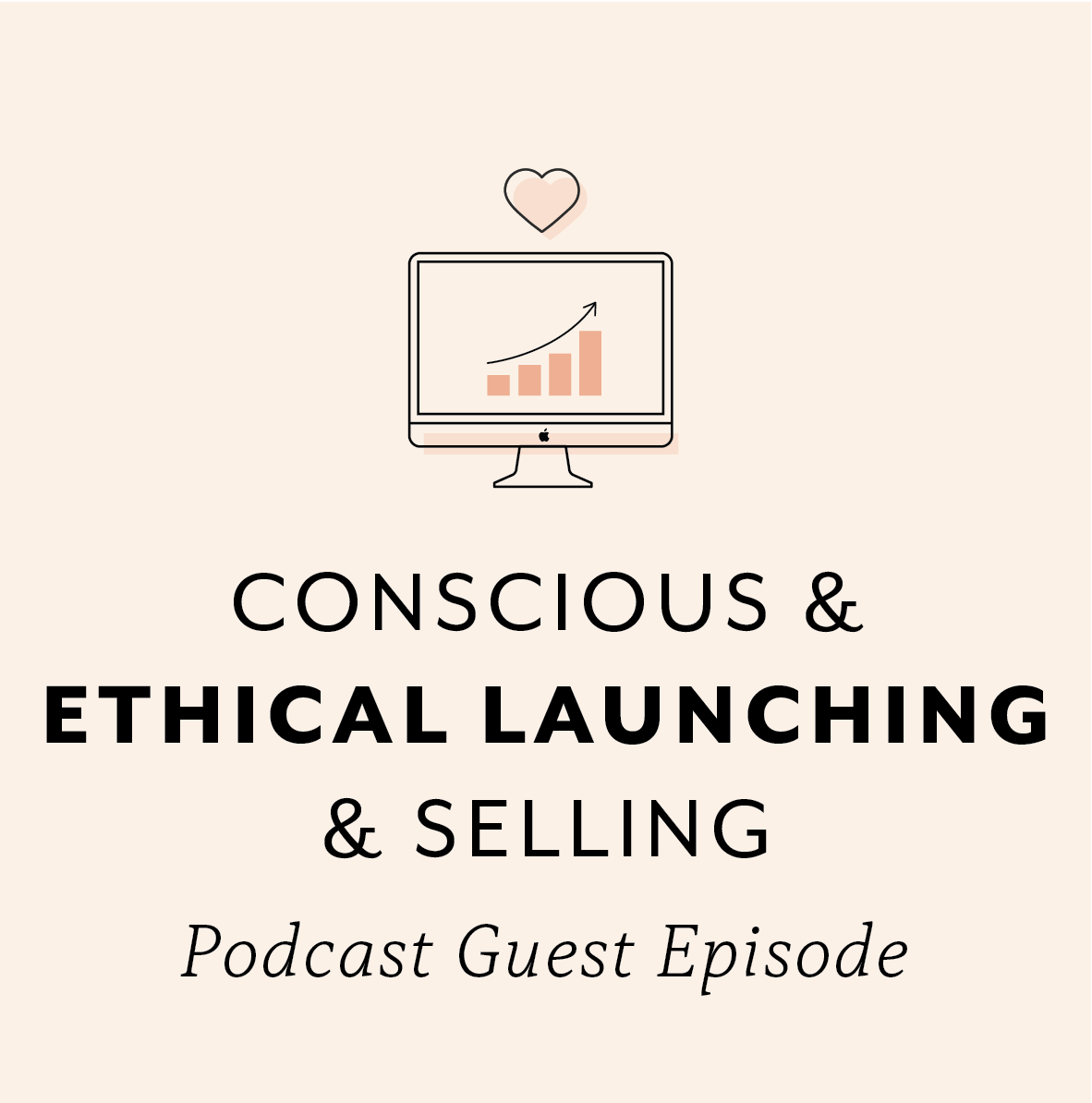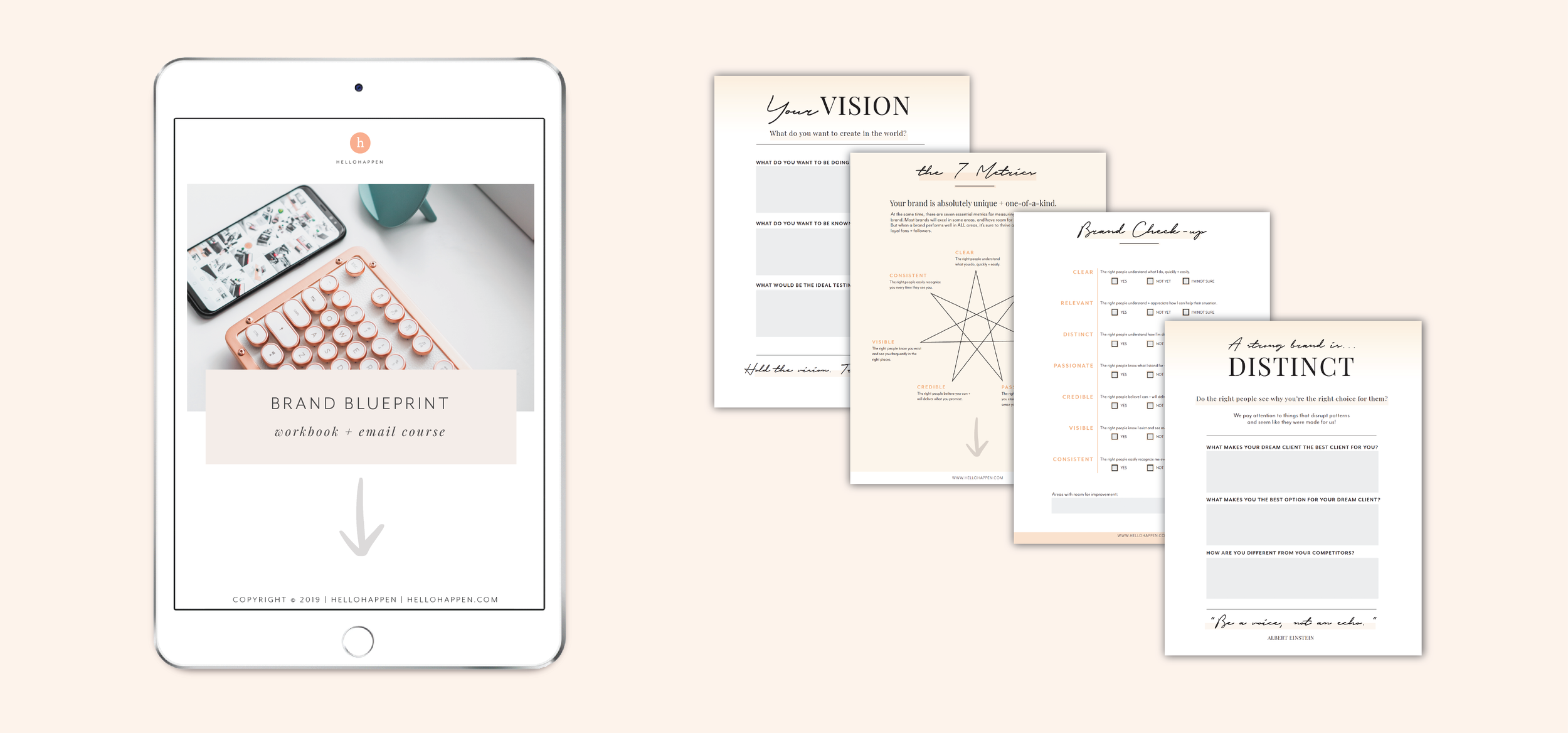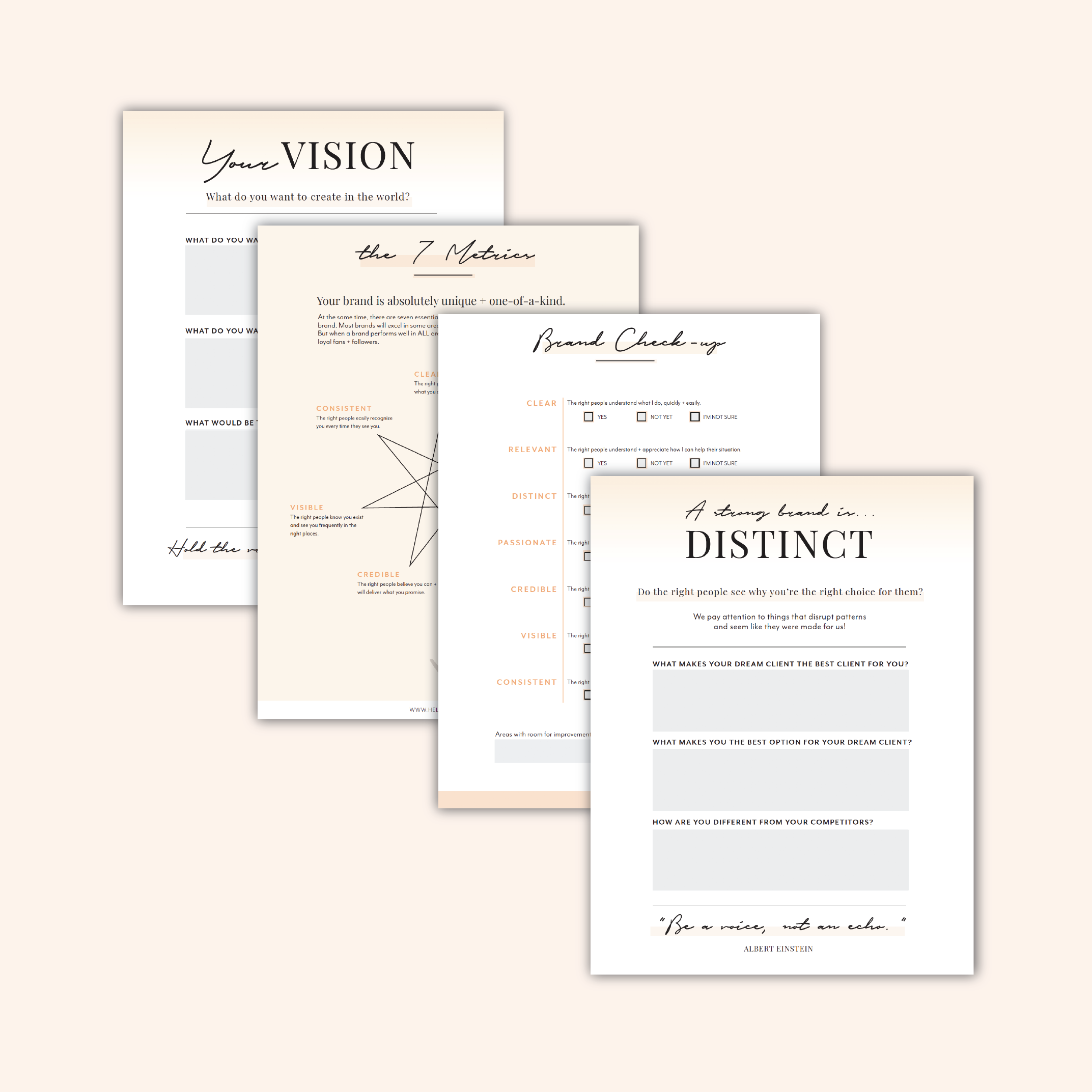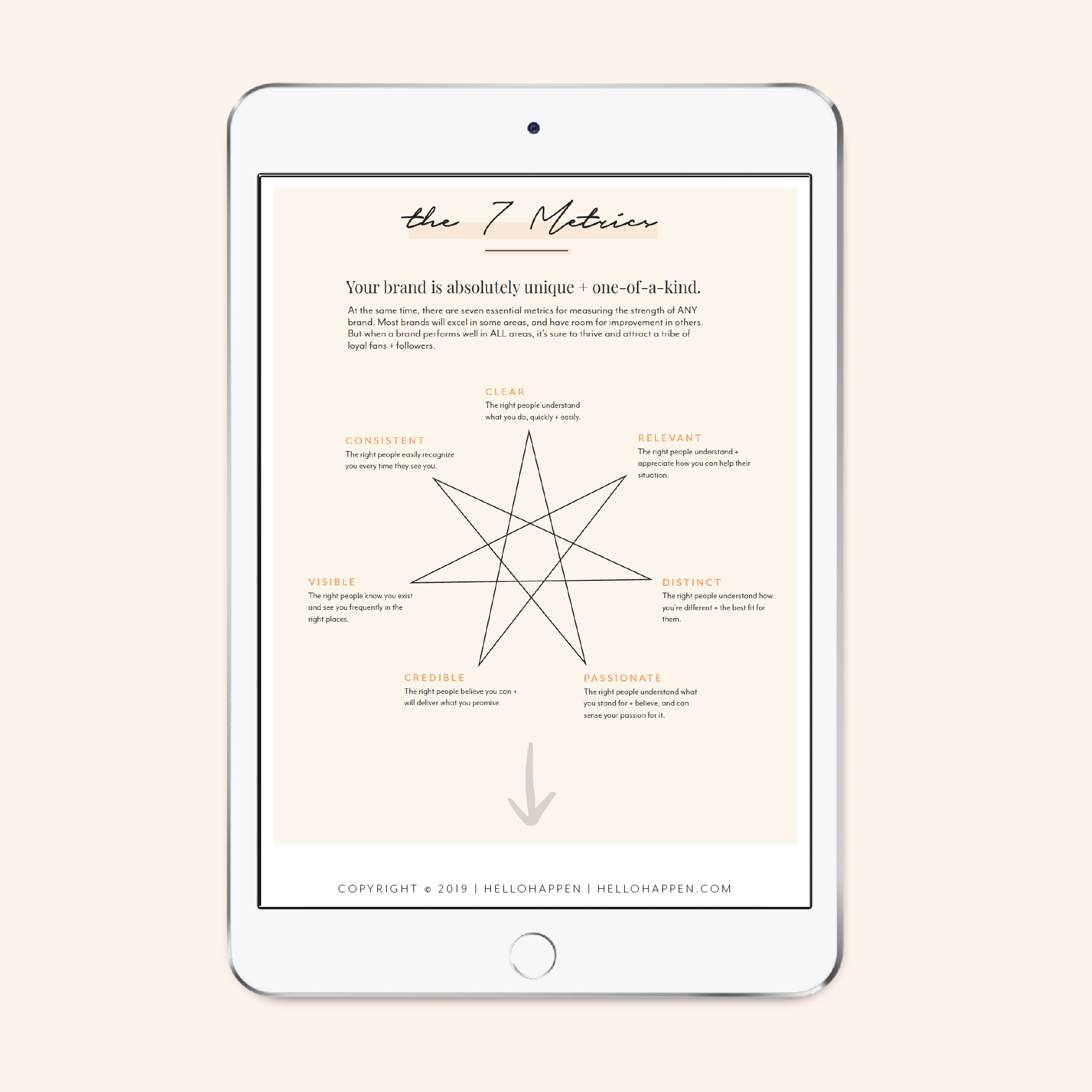How to Choose Your Niche
(Yep…Even if You Have Commitment Issues)
So, you’ve probably heard it before: You need to choose a niche! So in this episode, we take a look at how to choose a niche...and for those of you who feel a little anxious about choosing a niche, especially if you tend to be indecisive, I’ll explain how to choose a niche without really choosing a niche.
Listen to the episode on iTunes, Google Play, or Spotify — or read the abbreviated transcript below! I definitely recommend the podcast for all the juicy details!
Who is this episode for?
It’s for you if:
You've been in business for awhile, and now you want to raise your PRICES.
You’re launching a new product or service & want it to SELL!
You want to PIVOT and start engaging a different type of customer.
You want to attract more DREAM clients to your business — people who LOVE what you’re all about and who bring out the very best in you.
You’re just starting out & aren’t sure what kind of biz you want to build.
why you need to choose a niche!
do you avoid “niche-ing down”?
It’s totally natural to avoid choosing a niche when we look to major brands for inspiration. They appeal to everyone, right? Well… not really. They actually start with a small niche market, and try to attract more people into that market.
Even big brands choose a niche
Take Apple for example. Apple started by appealing specifically to creatives and people who “think differently,” NOT people who wanted to fit in or fit into some mold. Over time, Apple grew that market. Apple made that tribe, its community, cool. More and more people wanted to belong. Today, even people who don't have a creative business want an Apple computer. It’s a status symbol for creative thinkers. Now, oddly enough, Apple has become SO ubiquitous that non-Apple computer brands are pushing back and positioning themselves as the rebels and the rulebreakers. But Apple still hangs onto that image, and that legacy in its marketing.
(In the podcast episode, I share an embarrassing story about myself, to illustrate this idea of finding your niche and speaking directly to them. But... if you want the embarrassing story, you’ll have to listen to the episode!)
Why not appeal to everyone?
If you try to appeal to everyone, the competition at this level is super super fierce, and the market is really saturated. It's much much harder to get noticed this way. You're jumping into a very very crowded market.
About “niching”
The word “niche” comes from the French word, “nicher,” which means, “to make a nest.” So you're building a little nest, where you can nurture and grow your business while it's just a little baby business.
Your little baby business needs a safe space to grow! You don't want your little business hopping around on the forest floor before it's ready! You don't want to force yourself to compete with the big guys. It's better to have a safe little nest where you can fatten up your business and prepare it for its life ahead.
When you choose a corner of the market to dominate, you can position yourself as the best at something small and specific. And to the right person, that's not small at all! That's a big deal. You’re positioning yourself as the only logical choice, and becoming the go-to guy or girl for that specific thing.
An example: Building your dream house
Let’s say you decide to build your dream house — maybe you want a big spacious farmhouse with a wraparound porch, big windows, lots of natural light, etc.
You need to hire a builder!
Two builders come to you. The first one tells you, “I can build anything.” The second one says, “I specialize in building custom farmhouse-style homes, with spacious porches, big windows, and lots of natural light.
Which one would you choose? Probably the second builder, even if she’s more expensive. Because she has specialized! She has built homes like this before, knows what pitfalls to expect, what the different options are, and how to really customize it. She’ll be able to create a curated experience that delights a specific type of customer, instead of creating a generic experience that just doesn’t upset anybody.
People all over town who want a farmhouse-style new home are gonna compete to get on her schedule, because they know that she's the best at what she does!
About commodity businesses
Let me stop and say that building a commodity business is okay! I am not saying that you can't build a commodity business, like the builder who builds anything and isn’t specialized.
Those businesses succeed because they can produce such a high volume of product, and sell a high volume by keeping their prices really low, and appealing to the mass market - the people who make their purchase decision based on who has the lowest price.
(Side note: I’m not knocking people who look for deals. Most of us buy at least some commodity products, and choose to splurge on brands in product categories we care about. Maybe you buy the cheapest coffee you can find at Kroger, and then splurge on a Coach purse. Meanwhile, I may shop at TJ Maxx all year, so I can afford to drink Black Ivory coffee at $500/pound.)
Commodity brands sell a high volume of their product. And that's perfectly fine, if you want to build a business like that competes on the basis of price. You don't need to set yourself apart or serve a niche audience. You just need to have the lowest price option.
But I’m guessing you don't want to have the lowest option on the market and compete in a race to the bottom. I’m betting you want to raise your prices, not lower them! You’re looking for clients who will pay a higher price for your product, not a lower one.
Treat your customer like a brand, not a commodity
To create a product or a service that people will pay a premium for, you have to treat your client like a premium customer. You have to treat them like they're special.
If you treat people like a commodity — like you’re eager to sell to anyone who has enough cash in their wallet — you can only build a commodity business. People can tell you’re looking at them with dollar signs in your eyes, and will treat them like a number.
But if you want to build a brand that people consider the one and only option for them, that they’re willing to pay a premium for, then you have to treat them like a brand. Like they're not just a number, or the money in their wallet. You're telling them, “I know all the ins and outs all the problems that you're dealing with, all the struggles that you have, and I can help you move past them. Because I've worked with people like you, I know the terrain, and you are not just a number to me — in fact, I’ve specialized in working with people like you.”
How to define your niche
So how do you define your niche?
Get clear about the problem that you're solving, the person that you're solving it for, the profitability (you niche needs to actually serve your business to be sustainable) and the other players in that niche.
1. Define the problem.
What problem are you qualified to solve? What problem are you passionate about solving, and especially well qualified to solve, because of your personality, your credentials, your talents?
2. Identify the market.
Who has this problem, and what kind of person do you most want to work? What types of people you would really love to work with?
3. Assess the profitability.
Are those people willing to pay enough for a solution to that problem that it will be profitable for you? Think about the goal that they want to achieve, and the value of reaching that goal, and the cost of not reaching that goal.
4. Assess the competition.
Who else is already solving this problem for this market, and are they dominating the space? Is there room for me? What opportunities are being left on the table? Who is being under served by the existing players in this market?
If one competitor is deeply entrenched, then you have to decide whether to get more specific, or pick a different niche, or try to dive in and unseat or compete with that competitor.
You want to try to avoid “red, bloody water” because that's where little companies are getting gobbled up by the big sharks, the big predators already dominating the space. Instead, you want to look for “blue ocean” - a wide expanse where there are lots of opportunities and few competitors. Create your own little niche, your own little nest, for your business to develop and grow in, and that you can really dominate.
5. Test your niche
Now you want to test your niche. And you can do that in any number of ways. You can talk directly to the people that you want to be working with, you can do interviews, you could send out a survey… Ask the people you want to work with, what they've tried before. Did it work? Why or why not? What is missing?
if you’re feeling indecisive
Here's the problem. It’s not always easy or obvious to choose your niche. Most of us have experienced some of that paralysis — it feels like a huge commitment! And if you are a little bit resistant to commitment, devoting yourself to one corner of the market, I get it.
There is a way to niche without committing fully on the front end!
Test drive your niche
Spend one month focused on that niche. You can make that the theme of your blog, you can make that the type of people that you're gonna go after working with, you can create a specific product for that niche, and give yourself some time to kind of dip your toe into that niche market, and test drive it.
Give yourself time to figure out, is this something that I enjoy? Is this something that I want to do more of? If it's not, that's okay. You can move onto the next thing.
Choosing your niche is not a life sentence. I said this before, but what your business looks like right now is not what it's going to look like a year from now! You're going to continue learning more about who you want to work with, and the type of work that you really excel at, and enjoy.
As you figure out your niche, just keep in mind that you can always change it later down the road.
Wrapping up
When you specialize, when you really know your niche, know who you're trying to attract, what problem you want to solve for them, you finally know who you're here to impress and attract into your world into your business.
Make sure you catch the full episode on iTunes or Google Play for more tips, examples, and strategies you can use to get clear about your niche!
Hey! I’m Ashley.
I’m all about growing your mission-driven business with heart and intention! If you need help connecting authentically with your dream clients, you’re in the right place!
pin this post:
more on the blog
from the shop:
Swipe my free
BRAND BLUEPRINT + 7-DAY EMAIL COURSE
Grab the Blueprint, find a cozy spot, and let’s build your stand-out brand together! Join my email list and get my Brand Blueprint + 7-day Email Course for free. (You can unsubscribe anytime, but I don’t think you’ll want to!)


